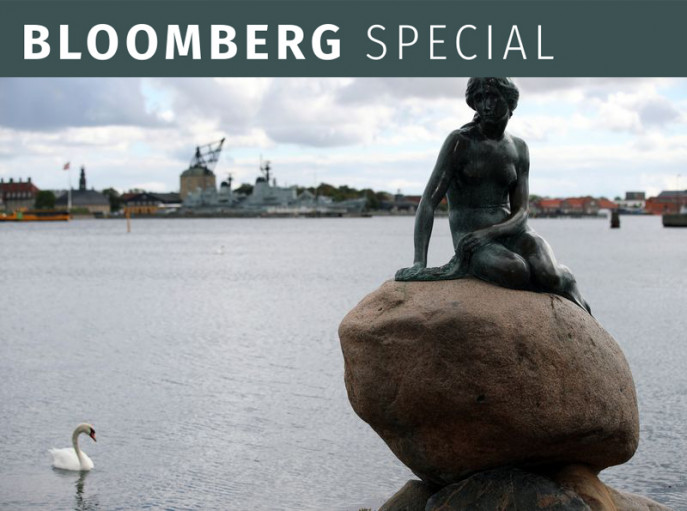Don’t play Russian roulette with oil in the Baltic Sea

Every day, dozens of oil tankers cross the narrow waterway. It's a linchpin of global trade. Shut it down and gasoline prices spike everywhere. Right now, geopolitical tension is high, and the navies of many great powers have warships patrolling it.
If you think we're talking about Iran and the Strait of Hormuz, you're not remotely close.
No — welcome to the frigid waters of the Danish straits, the narrow waterway overlooked by Copenhagen that links the Baltic Sea to the North Sea and the open waters of the Atlantic Ocean. They matter now because they are a key conduit for Russian crude and refined oil products into global markets, making it a chokepoint for the Kremlin's finances.
It's where geography, history, and politics are clashing.
The straits, at one point just 4 kilometers (2 ½ miles) wide, are at risk of being ensnared in a tussle between the US and Europe on one side and Russia on the other.

In early December, new European Union rules will make it illegal to provide maritime services to anyone exporting Russian crude – even to third countries. But the straits are a difficult passage: Storms are common, the waters are shallow, the coast rocky, and submerged sandbanks often move with the currents, reducing draft unexpectedly. That's why the Danish government, and the United Nations' International Maritime Organization, strongly recommend – although don't require – every vessel, particularly oil tankers, to hire a Danish pilot for the crossing.
In theory, the new rules could keep Danish pilots from boarding tankers full of Russian crude, perhaps preventing them from sailing into the high seas. In Washington, officials have quietly flagged that risk as a reason why third countries – say, China and India – should accept the G7 oil price cap on Russian oil, allowing them to continue using the pilots.
The reality is a bit more complicated.
To understand it, one must delve into history, starting with the "Treaty for the Redemption of the Sound Dues," signed in Copenhagen in 1857, which regulates to this day navigation through the straits. It says that Denmark should "supervise" the pilotage service through the straits, in effect creating an obligation to provide the service, according to Danish officials.
I asked the Danish Maritime Authority whether the EU sanctions will prohibit the provision of pilots to tankers full of Russian oil. In an emailed statement, it said: "Vessels enjoy the right of innocent passage through the Danish Straits, as defined by international law. Furthermore, Denmark is required to make pilots available to ships in innocent passage."
"There is no obligation on ships to make use of pilotage services when exercising the right of innocent passage," it added, insisting however that both the Danish government and the IMO, of which Russia has been a member since 1958, "highly recommend" the use of pilotage services.
In the statement, the Danish Maritime Authority added: "In conclusion, Denmark cannot prevent oil tankers from passing from the Baltic Sea to the high seas."
Copenhagen may ultimately reconsider its position, but its current approach seems right. Using the pilotage service to try to institute a de facto blockade on Russian oil exports would be wrong — and dangerous. European and US officials are right to try to strangle Russian oil revenue. Oil exports are financing President Vladimir Putin's invasion of Ukraine, and helping him to sustain local support for his regime. But there are other, and better, ways to achieve that objective without jeopardizing maritime safety. The EU sanctions package, which will stop buyers of Russian oil from using the European financial sector and its oil tankers, is the way to go.
As with the vessels that shuttle sanctioned Iranian and Venezuelan crude, Russian oil is increasingly moving into the world's ghost fleet — rusting old tankers, flagged in countries with little appetite for safety inspections, and increasingly insured by dubious newly created operations. The owners are opaque shell companies. The crews are badly paid and often untrained. If Copenhagen were to refuse pilots to Russian oil tankers, the vessels would still be able to sail through the straits, exercising their international right of innocent passage, but at a much greater risk of a collision or, worse, even an oil spill.
Withdrawing the pilotage service in the dangerous waters of the straits is playing, ahem, Russian roulette. The last thing we need to add to the already high cost — in lives and property — of the Russian invasion of Ukraine is something like the Exxon Valdez catastrophe in the Baltic.
Javier Blas is a Bloomberg Opinion columnist covering energy and commodities. A former reporter for Bloomberg News and commodities editor at the Financial Times, he is coauthor of "The World for Sale: Money, Power and the Traders Who Barter the Earth's Resources."
Disclaimer: This article first appeared on Bloomberg, and is published by special syndication arrangement.



 Keep updated, follow The Business Standard's Google news channel
Keep updated, follow The Business Standard's Google news channel















